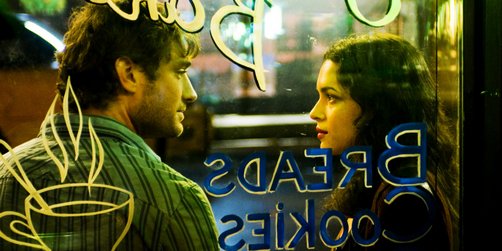Survey
Your favourite film genre is…
|
My Blueberry NightsDrama
A film review by James Rocchi, Cinematical

Hong Kong, China, France, 2007
Director Wong Kar Wai
Starring Norah Jones, Jude Law, David Strathairn, Natalie Portman, Rachel Weisz
From almost any perspective, My Blueberry Nights is the perfect pick to open the 60th Cannes Film Festival: A noted international director (Wong Kar-Wai) making his English-language debut, with a cast of international stars (Norah Jones, Jude Law, Natalie Portman) and exciting memories of past appearances at the Festival as part of the bargain — in 2004, Wong Kar-Wai’s 2046 was such a fresh work that the screenings of the film had to be pushed back, as the print was literally still wet. At this morning’s press screening, you could hear cineastes sigh in rapture from the opening titles — blue-glazed visions of pie and cream, indigo skies with neon-glow cityscapes leaning lazily against them.
My Blueberry Nights follows Elizabeth (Norah Jones), as her recent fresh breakup sends her down into the depths of loss and then across the country. Elizabeth lives in New York, but after friendly café owner Jeremy (Jude Law) unintentionally informs her that her boyfriend has been out with another woman, she’s at a loss — spending late nights in his café, eating blueberry pie and taking comfort in his gently bruised romantic philosophies. Jeremy’s place has, over the years, become a bit of a depot for broken-hearted lovers to leave their keys — why, exactly, this tradition came about is never fully explained in Wong and Lawrence Block’s screenplay, but still — and he’s able to share with Elizabeth some of the tales of loss and love connected to each set.
Elizabeth isn’t consoled by those tales, though, and sets out rambling — we see her stop in Memphis and Nevada, get a glimpse of time spent in California and Arizona — working waitressing jobs along the way. When it was announced that Jones would be taking the lead in Wong’s film, the question arose: Would Jones make the leap from pop stardom to the silver screen, as many others have tried? There’s certainly no doubt that Jones has a certain presence on-screen — Wong and cinematographer Darius Khondji love to show her face, framed with a lush corona of pitch-black hair — but her skills as an actress are occasionally shaky; early in the film, she’s a flat and unmoved presence; she doesn’t seem to be speaking from the life of a character, but, rather, reading from the lines of a script.
Jones’s line readings improve later in the film — or maybe it’s just because we get to see her bounce off of different actors, and she’s no longer the sole focus of the film. In Memphis, she becomes embroiled in the slow-simmering tension between an alcoholic cop (David Strathairn) and his estranged wife (Rachel Weisz); in Nevada, she gets tangled up in the schemes of a gambler (Natalie Portman). Each of these actors gives the film a necessary boost — Strathairn’s boozy, bleary sadness leaks off the page; Weisz appears on-screen as a sunglasses-wearing vision that will seem familiar to any fan of Wong’s work and Portman gives the film some much-needed acid tang as a confident conniver with a heart of lead.
My Blueberry Nights is so beautifully shot, though, that you’d be excused for thinking that the quality of the performances is almost irrelevant; each scene is a symphony of color and light, each frame exquisitely shaped by the play of pigment and shade. New York is caught in blue, wintry tones; Memphis in deep, relaxed browns; Nevada’s casinos come alive in jittery crimson. It’s too bad that we can’t quite believe in the characters within those gorgeous visions, though — and the film’s on-the-nose dialogue and slack voice-overs don’t help. “All her life, she had lied about her feelings for her father … but the only person she was fooling was herself.” This is the sort of thing that you would rather see than hear, and My Blueberry Nights is full of these moments — lengthy stretches of film where we’re having emotional and thematic meanings spelled out for us like we were slow children. On occasion, the screenplay itself can feel a little schizophrenic — the grit and rawness of some scenes gets worn down by the sentiment of others; snappy exchanges nestle uneasily close to lengthy narration.
Still, only the hard-hearted will pause to object to those moments; most of us will be swept away by Wong’s visions and his depiction of love, loss and life — Strathairn’s performance alone is particularly devastating, and the tone of the piece is more than enough to inspire any viewer to reflect on their own loves past and present. My Blueberry Nights ends exactly as you expect it to — with our two confidantes reunited and facing a tentative future as lovers. Then again, you want it to end like that. My Blueberry Nights may be a bit more interested in look than feel — it conveys blue as a color far more effectively than it conveys blue as an emotional state — but it’s a feast of beauty while it gracefully unfolds on-screen.
|